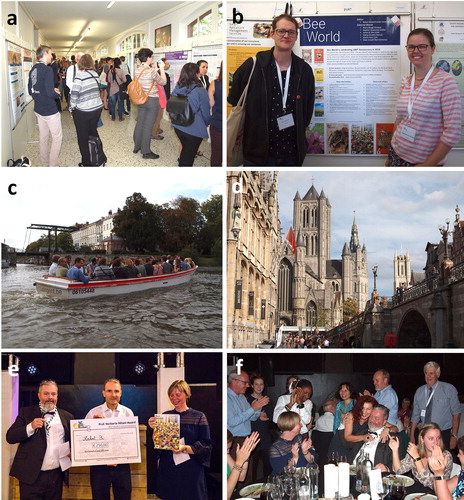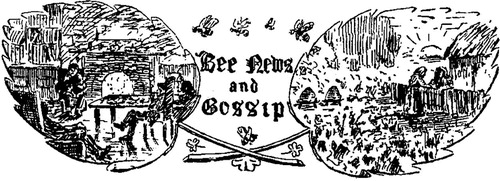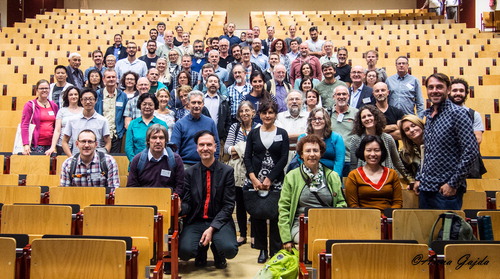The historic city of Ghent, Belgium was the setting for the recent COLOSS and EurBee meetings, both of which were held at the campus of the University of Ghent. The 14th COLOSS Conference was attended by more than 100 delegates from 25 countries (). COLOSS is an international bee research network which currently has 1,179 members from 95 countries worldwide. Celebrating more than ten years of existence, it has now existed for longer as an independent nonprofit association than in its original form as an EU funded “COST Action.” It is currently supported by the Ricola Foundation, Véto-Pharma and the Eva Crane Trust.
As usual, the COLOSS conference consisted of updates from the many active Core Projects and Task Forces. The “monitoring” group has now completed ten years of beekeepers’ surveys in many countries, so a paper examining long term data trends is currently in preparation, and the Bridging Research And Practice (B-RAP) group has now devised a number of surveys of beekeeping educational practice. The Vespa velutina Task Force is writing an additional chapter for the COLOSS BEEBOOK covering the Asian hornet, and plans are also afoot to widen the scope of the existing BEEBOOK to cover research on the easern hive bee Apis cerana and African and Africanised bees. Progress in the new Task Forces covering “survivors” and “viruses” was also presented.
Several talks featured results from SmartBees, an EU funded project involving many members of the COLOSS Research Network on Bee Breeding and which is shortly coming to a successful conclusion, and mention was also made of a number of new EU funded projects including PoshBee, EurBeST, and INSIGNIA which involve many COLOSS members, and build on the results of previous COLOSS projects.
After two intensive days of COLOSS, it was on to the Opening Ceremony of the larger 8th European bee research conference EurBee ( and ). EurBee 8 was attended by approximately 450 delegates from throughout Europe, but also from the USA, Australia, New Zealand, and Asia together with a team from Canada promoting Apimondia 2019 in Montréal. As well as current Bee World Editor Robert Brodschneider, delegates included former Bee World editors Richard Jones and Kirsten Traynor, new Journal of Apicultural Research editors Maria Bouga and Melanie Parejo, together with IBRA Council Members Dirk de Graaf, Jamie Ellis, Fani Hatjina, Robert Paxton, and Octaaf van Laere.
Figure 3. a. Stimulating discussions at the EurBee poster sessions. b. Bee World Editor Robert Brodschneider and Editorial Board Member Maja Smodiš Škerl with the poster celebrating the centenary of Bee World in 2019. c. The social program included a trip on the canals. d. The famous “three towers of Ghent.” e. Organizers Dirk de Graaf and Lina de Smet hand over the Prof. Norberto Milani Award for best oral student presentation and a copy of Bee World to Robert Paxton for his student Belinda Kahnt. f. EurBee President Dirk de Graaf is congratulated by delegates including Fani Hatjina and Richard Jones (All photos except e: Norman Carreck, e: EurBee).

The conference consisted of six plenary talks together with 157 other talks and 221 posters, in up to four parallell sessions. For me, I think highlights included significant progress on our understanding of the biology of varroa and its relationship with viruses. In particular the talk by Samuel Ramsey of the University of Maryland, USA, who has demonstrated that varroa feeds on the fat bodies of bees, rather than exclusively on the bee’s hemolymph, as has previpously been assumed, has wide ranging consequences. The Asian hornet Vespa velutina is currently of particular interest to me due to its recent invasion of the UK, and it is pleasing to see that significant advances in tracking technology and understanding its spread and biology are taking place. I did feel, however, that unfortunately there were fewer papers on non-Apis bees than in previous conferences and this is something that the organisers of the next conference need to address.
Despite the busy conference schedule there was also time to visit the charming city of Ghent, and sample some of its fine food and vast array of different beers. At the conference banquet, awards for the best student oral presentation and best student poster were made in memory of EurBee founders Ingemar Fries and Norberto Milani. One of the prizes was a years’s subscription to Bee World. Thanks are due to Dirk de Graaf and his team for excellent organisation of both conferences. EurBee 9 will be held in Belgrade, Serbia in 2020.
ORCIDNorman Carreck http://orcid.org/0000-0001-7779-9736Norman L Carreck
Carreck Consultancy Ltd., Southwater, RH13 9GL, UK.
Laboratory of Apiculture and Social Insects, University of Sussex, BN1 9QG, UK.
Email: [email protected]



![Figure 2. [Some of] the delegates at EurBee 8 (Photo: EurBee).](/cms/asset/16802e10-7dc2-424d-a82c-d2801ba77dbd/tbee_a_1535030_f0002_c.jpg)